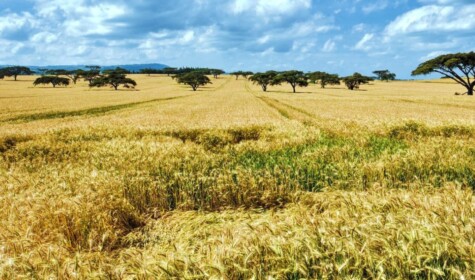In the last few weeks, we have all experienced the impact that COVID-19 has had on food supplies. With supermarkets picked clean, many are wondering whether this is a short-term reaction to the crisis or a prelude to more significant shortages as global trade grinds to a halt. Uncertainty about food availability could spark a wave of export restrictions, resulting in shortages on the global market and price spikes.
Already, there is increased price volatility due to the perceived likelihood of trade restrictions, with wheat prices climbing 8% and rice prices by 25%. Of even greater concern is Nigeria, where rice prices increased by more than 30% at the beginning of the outbreak in March in response to panic purchasing. This volatility, coupled with the domestic restrictions that many nations have placed on their citizens to control the spread of the disease, has led to worrying developments around the world, particularly in the Global South. In Zimbabwe, police confiscated and burned three tons of fruits and vegetables from farmers who had broken movement restrictions, while a stampede broke out at a food distribution centre in Nairobi, resulting in numerous injuries.
In order to head it off at the pass, the WTO, WHO and FAO put out a joint statement encouraging countries not to limit their exports of food. The joint statement by their respective Directors-General highlighted the fact that ‘millions of people around the world depend on international trade for their food security and livelihoods,’ and continued to say that, ‘now is the time to show solidarity, act responsibly and adhere to our common goal of enhancing food security, food safety and nutrition and improving the general welfare of people around the world’.
However, despite the plea, many nations have already acted to limit exports or stockpile commodities in order to guarantee that domestic food security is met. For example, Vietnam, Cambodia and India banned the export of rice, while Egypt decided to halt the export of legumes for three months to preserve local supply. More dramatically, the Eurasian Economic Commission, which unites the customs zone of Russia, Belarus, Armenia, Kyrgyzstan and Kazakhstan, decided to restrict exports of sunseed, buckwheat, rice and rye until 30th June and to not supply soybeans and some vegetables such as onions outside of the union until the same date. In Europe, Romania has announced an export ban on certain cereals as part of new measures to cope with the coronavirus outbreak while Serbia has stopped the flow of sunflower oil.
While these actions by individual states might not seem concerning from the other side of the world, the ramifications could be significant. As countries move to enact measures to protect their own citizens from the COVID-19 pandemic, there is a risk that those actions might unintentionally create shortages of essential items and exacerbate hunger and malnutrition in other parts of the world. For some global commodities, a handful of countries – or even fewer – make up the bulk of exportable supplies. Disruptions to those shipments would have major knock-on effects, with the most catastrophic consequences being felt by the most vulnerable populations. Take, for example, Russia, one of the world’s top wheat exporters and a key supplier to North and West Africa. If President Putin were to limit exports of wheat, families in Nigeria might struggle to buy bread.
Thus far, global supply chains are functioning, despite the disruption, and we have continued to see food move across the world. Unlike the aforementioned countries, the majority of the world’s nations have committed to continuing trade. Italy, one of the worst affected nations, has prioritized agri-food exports that are worth approximately €44.6 billion annually. The US has classifiedseafarers, port staff and other maritime workers as essential personnel to ensure trade flows, and has allowed farmworkers from Mexico to enter the country to maintain production levels.
Some nations have gone even further and have adopted more innovative approaches. Honduras has taken steps to ensure food security by planting food on unoccupied lands and 25 Latin American and Caribbean nations have signed an agreement of cooperation to coordinate regional food security during the pandemic. The declaration explicitly commits to supporting small- and medium-sized agricultural operations and ensures high-levels of collaboration in bioregional food security.
The SFT would hope that this collaborative approach to building food security through resilience and integration will continue once the crisis has passed. Adopting a bioregional and sustainable food system is critical to the creation of a resilient future. It will require widespread adoption of farming systems that are suited to the cultural landscape and physical geography of the region, coupled with the greater alignment between what people eat and the productive capacity of their local ecosystems. Currently, conventional agricultural practices dominate farming across the globe, characterised by high inputs of agrochemicals and intensive production. These need to be replaced with more geo-specific, regenerative approaches that minimise inputs, build soil fertility with crop rotations and integrated livestock. The long-term effect of switching farming practices towards more regenerative methods that are based within the local ecosystem, would help improve both environmental and public health.
To achieve this sustainable future, a new economic approach is needed – one that values and supports sustainable farming around the world. While the SFT would not advocate for a protectionist approach, we would support a system where small-scale farmers can simultaneously feed their family and earn a living producing food sustainably. Through collaborative advocacy, the global agroecological movement needs to build momentum behind a new economic and international trade system where farmers are financially supported for adopting sustainable practices, farming within planetary limits and enhancing their local food system. The current global economic model means that most farmers have no option but to employ agricultural practices that do not serve the public interest and that put them at the mercy of commodity agriculture. Once we have emerged out of this crisis, governments around the world need to unlock the barriers to change to create an international trade policy that supports farmers who use environmentally sound practices and provides all people with a healthy and nutrient-rich diet.







